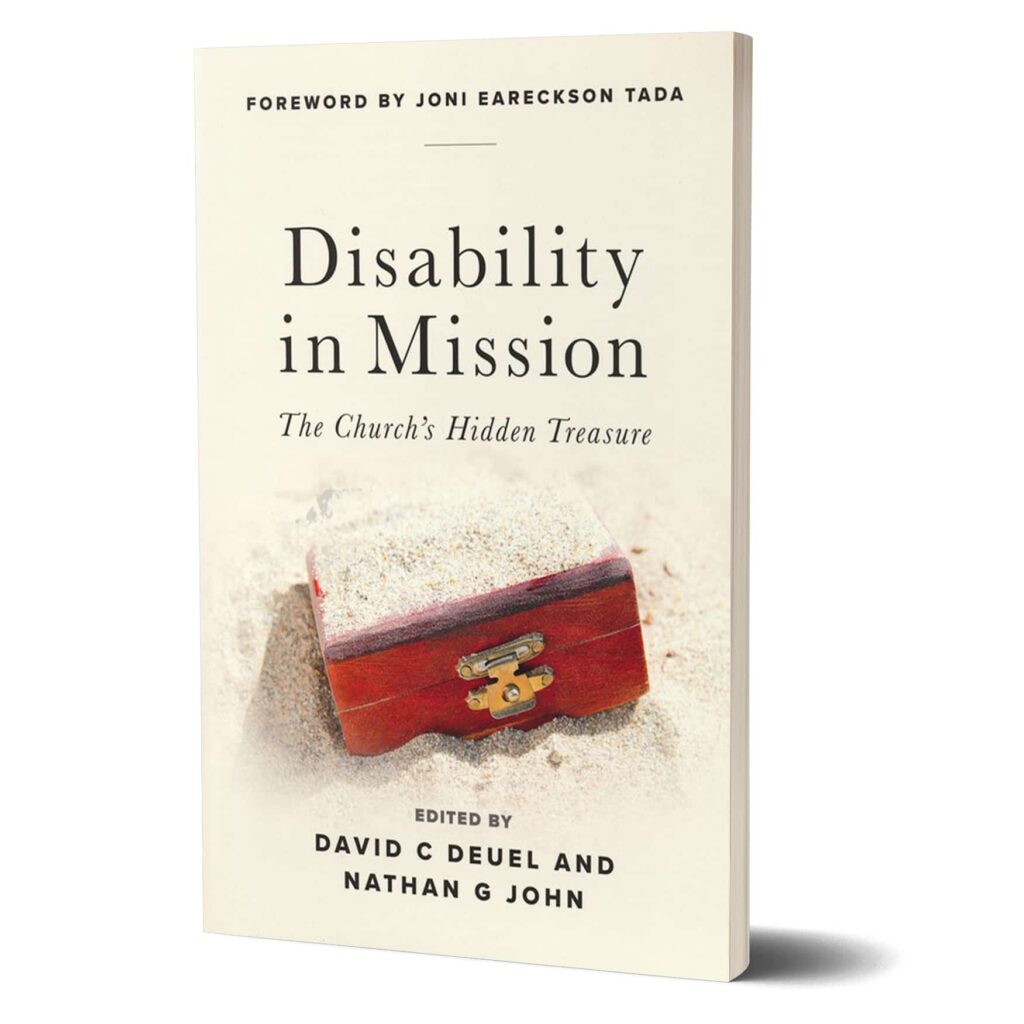Paul the Leper

Shouldn’t We Be Weaker?
How weak are you? A conclusion we commonly draw about weakness is that God accomplishes his work through us despite our weaknesses. But this is not what Paul teaches us in 2 Corinthians 10-13, his weakness exposé. The apostle argues that God works through us because of our weaknesses, not despite them. It is as different as night and day.
The book, Paul the Leper underscores this point on all its 28 pages. What makes this study most helpful is that from Paul Kasonga’s earliest days, both he and others around him interpret Kasonga’s leprosy and its disabling effects as weakness like the Apostle Paul describes the Corinthian passage. The biography’s spiritually self-analytical bend is what has made it so helpful to me.
I occasionally reread the little book but not for information, for inspiration. If Paul Kasonga with leprosy and its progressively devasting effects can be a church planter, a missionary, a Bible translator, a pastor trainer, and a soul caregiver because God blesses him and empowers him in his weakness, then shouldn’t we ask the question, how can we get weaker?
What Is Weakness?
In the Apostle Paul’s Corinthian message, weakness is not only a descriptor for a physical condition, it also is a spiritual concept derived from literal ‘illness’ or ‘condition.’ The Greek word which we translate ‘weakness’ varies in meaning depending on its context. What specifically does it mean for the Apostle Paul in 2 Corinthians 10- 13?

The Apostle Paul’s thorn in the flesh was probably a physical injury or disability of some sort as demonstrated by the qualifier, “in the flesh.” By God’s design, we don’t know what the thorn was, so we apply it to all forms of weakness. But in this same passage, it also serves as a figurative term that allows Paul to include a list of weaknesses, many not physical.
Using weakness as a category, the Apostle says, “That is why, for Christ’s sake, I delight in weaknesses, in insults, in hardships, in persecutions, in difficulties. For when I am weak, then I am strong” (2 Cor. 12:10).
Weakness applies to all these forms of suffering, and probably many more not listed. It’s a catch-all category in Paul’s message.
In this passage, weakness toggles back and forth between physical and spiritual. Weakness is not only “in the flesh,” but also a spiritual condition characterized by dependency. In fact, we might translate the Greek word for weakness as ‘dependency.’
Regarding this word Black says, “it presupposes that one’s whole being is dependent upon God and that men and women as creatures of God (like Adam) are susceptible to the limitations of all creation.”
He continues, “The concept of ‘weakness’ is for Paul in the first place the denotation of the human in its frailty, transitoriness, and mortality (5:6; 6:19; 8:26).”
In other words, to be human is to be weak. It applies to all of us.
This means that disability does not neatly equate with weakness. To the contrary, there are many people with disabilities who are not weak. And there are many people who have no disabilities who are. The real question is Who does God empower? How should we frame weakness biblically?
The Image of God
We were created in weakness for it characterized the first people made in God’s image. They had limited capacity and depended completely on God in a way that put the spotlight on God’s infinite and glorious power. Human weakness is God’s platform for his greatness. But then, the Fall brought another complex layer of weakness both physical and spiritual.

Weakness is not just a post-fall concept. In fact, the image of God entailed man’s connection with God as well as his reflection of God.
Francis Schaeffer said it well: “So the Christian’s task is to show forth, and act upon the character of God.” This show forth feature is what reflecting the image of God means. But to show forth God, the image we reflect requires a bystander, one who views God empowering us.
A Bystander for Every Stage
Reflecting God or showing him forth to others as Schaeffer describes is our creation assignment. We talk about living Christ and being an example before a watching world. But this notion is much bigger and more pervasive in Scripture than we often think. We see this bystander concept come up again and again in Scripture:
First, at creation in the image of God (Gen. 1:26-28); second, in the psalms with the bless-ed person who is envied by others (Ps. 1); third, in Ecclesiastes where Solomon says repeatedly, “I saw.” Solomon is a bystander; fourth, it expands to include Christians in all circumstances in the New Testament; fifth, it is the catch-all qualification, “above reproach” for pastoral and deacon ministry for it is underscored as a challenge for all Christians to live above reproach lives before others. It’s about how others view you.
The bystander is pivotal in Paul’s Corinthian mission weakness. It includes Paul’s opposition, but especially the Corinthian church to whom he writes. Paul’s mission to share the gospel in weakness is lived out on stage for all to see. In fact, we might liken weakness to a theater.
Paul’s Weakness Theater
Front and center stage in Olive Doke’s book, Paul the Leper is the ministry impact that God worked through Paul Kasonga on the people of Lambaland, now Zambia. Paul the leper as he was called, was a picture of weakness strengthened. We know this from the testimonies of those to whom he ministered which make up over one third of this little biography. Less than twenty pages tell Paul Kasonga’s story; a compelling ten more describe God’s impact through Paul’s weakness that others witnessed. In God’s weakness theater, these are the testimonies of bystanders.
And what do Zambian bystanders see in God’s theater?
The Apostle Paul says it clearly without even using the word ‘weakness’: “But we have this treasure in jars of clay to show that this all-surpassing power is from God and not from us.” (2 Cor. 4:7).
God’s power is the performance in his theater of the weak. All actors bow to the risen Christ whose power not only conquered sin, Satan, and death, but also daily defeats all other harmful powers including the sin that so easily entangles. In short, human weakness paradoxically provides the best opportunity to display divine power.
Are You Weak Enough?
In closing, David Alan Black describes weakness so powerfully:
Paul teaches that God’s way of exhibiting power is altogether different from our way. We try to overcome our weaknesses; God is satisfied to use weakness for his own special purposes. Too many become disheartened over their infirmities, thinking that only if they were stronger in themselves, they could accomplish more for God. But this point of view, despite its popularity, is altogether a fallacy. God’s means of working, rightly understood, is not by making us stronger, but by making us weaker and weaker until the divine power alone is clearly manifested in our lives.

All this happens before a by-standing world in God’s theater. No wonder, when asking for release from his weakness, the Apostle Paul says,
“But he said to me, ‘My grace is sufficient for you, for my power is made perfect in weakness.’ Therefore, I will boast all the more gladly about my weaknesses, so that Christ’s power may rest on me” (2 Cor. 12:9).
Again, Black says of the apostle Paul, “In the midst of his inadequacy and apparent disabilities is at work the grace of God that enables him to be a more-than-conqueror (Romans 8:37).”
The weak apostle is not just a warrior, but on God’s stage and to his glory, he’s a winner.
What does that look like in our spiritual life?
Pastor John MacArthur has said it this way, “There are many people in ministry too strong to be useful. There are no people in ministry too weak to be useful.” How useful do we want to be?
Questions for Reflection:
1.) Is it better for us to be weak or strong?
2.) Why would God use weakness to accomplish his plan?
Written By—Dave Deuel, PhD
Dave Deuel is married with four adult children, one daughter has Down syndrome. He also has a sister-in-law who has an intellectual disability. He is Academic Dean Emeritus for the Master’s Academy International, Senior Research Fellow Emeritus and Strategic Alliance SME for the Joni Eareckson Tada Disability Research Center, and Catalyst for the Disability Concerns Issue Network, the Lausanne Movement.
He served as Old Testament professor and department chairman at the Master’s Seminary for 10 years and in pastoral roles of local churches, five of which were church plants. He is currently elder for pulpit and interim pastor for area local churches in upstate New York.
- Olive Doke, Paul the Leper: Apostle to the Lambas was originally printed by the South African Baptist Press in 1955 and reprinted by the South African Baptist Historical Society in 2005.
- See also Galatian 4:13 in which Paul talks about his “weakness in the flesh” which prevented him from mission travel and Romans 6:19 where the same expression is applied to commitment leading to sanctification.
- H. A. W. Meyer, Corinthians (Winona Lake, IN: Alpha Publication, 1979 reprint of 1884), 485-86. Meyer supports this structural conclusion based on comparison with classical sources.
- The Greek word in the original is asthenia.
- David Alan Black, Paul Apostle of Weakness: Asthenia and Its Cognates in the Pauline Literature (Eugene, OR: Pickwick, 2012), 151.
- Black, Paul Apostle of Weakness, 146.
- Even “Christ, in his humanity became weak (2 Corinthians 13:3) in order to share in the same weakness that people experience as a matter of due course (cf. Heb 5:12)” (Black, Paul Apostle of Weakness, 110).
- As a quick aside, man grows progressively weaker from creation to the cross, but then progressively stronger because of the cross. This progressive weakening and empowering impacts our theology of counseling.
- “Actual likeness to God is not what being created in God’s image involves. Creation in God’s image is God’s expressed intention that people exhibit the special connection they have with God through a meaningful reflection of God.” (John F. Kilner, Dignity and Destiny: Humanity in the Image of God [Grand Rapids, MI: Eerdmans, 2015], 79). The author clarifies, the image concept isn’t talking about traits and attributes that we have—that are in us—but about our special connection with God and God’s intention that those connected with him should reflect his attributes increasingly, according to the model of Christ, as much as possible. This explanation was provided by Dr. John Kilner in personal correspondence received November 3, 2020.
- Francis A, Schaeffer, No Little People: Sixteen sermons for the Twentieth Century (Downer Grove, IL: InterVarsity Press, 1974), 44.
- Waldemar Janzen, “Ašrê in the Old Testament,” Harvard Theological Review 58 (2) (April 1965): 215-226.
- Of this verse, Black says, “Paul’s existence as an ‘apostle of weakness’ in an earthen pot (2 Cor 4:7) has tremendous significance in that it serves to make clear to others that the source of his power is God and not himself” (Paul Apostle of Weakness), 52.
- Black, Paul Apostle of Weakness, 156. 14 Black, Paul Apostle of Weakness, 162. 15 Black, Paul Apostle of Weakness, 111.
- Spoken by Dr. John MacArthur at Together for the Gospel conference, Twitter post by Richard Gregory, April 12, 2018, https://twitter.com/RichardPGregory/ status/984504149978042369.

Disability in Mission
Disability in Mission: The Church’s Hidden Treasure outlines a radical change in approaches to missiology, missions, and praxis for the twenty-first-century global cultural context. It explores a pattern whereby God works powerfully in missions through disability and not in spite of it.





